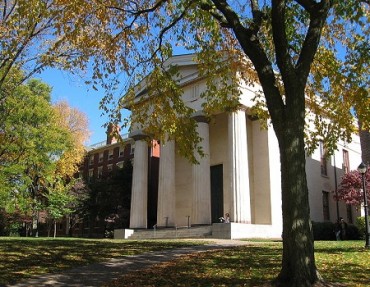
‘Our analysis made clear that SAT and ACT scores are among the key indicators that help predict a student’s ability to succeed and thrive in Brown’s demanding academic environment’
Brown University this week become the third Ivy League institution in the span of about one month to reinstate its SAT requirement, following Yale and Dartmouth.
President Christina Paxson accepted the recommendations of the Ad Hoc Committee on Admissions Policies to reinstate the standardized test score requirement, the school announced Tuesday. The requirement will begin starting with next year’s applications for the class of 2029 after it was suspended due to COVID testing limitations in 2020.
The decision followed six months of analysis by the committee, the university stated, adding the test scores will be viewed within Brown’s “‘testing in context’ approach to ensure understanding that tests are interpreted in the context of an applicant’s overall record, background and opportunities through a process that considers the whole person.”
“Our analysis made clear that SAT and ACT scores are among the key indicators that help predict a student’s ability to succeed and thrive in Brown’s demanding academic environment,” Provost Francis Doyle stated. “Consideration of test scores in the context of each student’s background will advance Brown’s commitment to academic excellence and the University’s focus on ensuring that talented students from the widest possible range of backgrounds can access a Brown education.”
According to the university’s announcement, campus officials’ analysis also “suggested unintended adverse outcomes of test-optional policies in the admissions process itself, potentially undermining the goal of increasing access. The committee was concerned that some students from less-advantaged backgrounds were choosing not to submit scores under the test-optional policy, when doing so could actually increase their chances of being admitted.”
“Members were cognizant of the fact that applicants from less-advantaged backgrounds may present with scores lower than the typical range and that more privileged applicants with high scores may benefit from test preparation and tutoring,” Brown’s statement added.
“However, strong testing, interpreted in the context of a student’s background, may serve to demonstrate their ability to succeed at Brown, the summary noted — and the lack of scores may mean that admissions officers hesitate to admit them.”
Likewise, when Dartmouth College in early February announced its decision, it cited similar arguments, stating “test scores were a better predictor than high school grades — or student essays and teacher recommendations — of how well students would fare at Dartmouth.”
Yale echoed those sentiments.
“Simply put, students with higher scores have been more likely to have higher Yale GPAs, and test scores are the single greatest predictor of a student’s performance in Yale courses in every model we have constructed,” said Jeremiah Quinlan, dean of undergraduate admissions, in an interview with the Yale Daily News when the decision was announced in mid-February.
In 2022, MIT, another elite institution, also reinstated the SAT requirement.
MORE: ‘Convinced by the data’: Dartmouth College reinstates SAT requirement
MORE: Yale will require SATs for admissions again next fall
IMAGE: Shutterstock
Like The College Fix on Facebook / Follow us on Twitter




Add to the Discussion